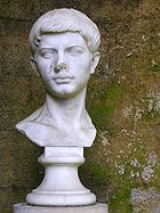
Virgil
Publius Vergilius Maro known in English as Virgil or Vergil, was a Latin poet, the author of the Eclogues, the Georgics and the Aeneid, the last being an epic poem of twelve books that became the Roman Empire's national epic.
Georgics
- Audacibus annue coeptis
- Translation: Look with favor upon a bold beginning.
- Georgics, Book I, line 40
- Umida solstitia atque hiemes orate serenas,
agricolae.- Translation: O farmers, pray that your summers be wet and your winters clear.
- Ut varias usus meditando extunderet artis
paulatim.- Translation: Practice and thought might gradually forge many an art.
- Ignavum, fucos, pecus a praesepibus arcent.
- Translation: They keep out of the hives the drones, an indolent bunch.
- Georgics, Book IV, line 168
Eclogues
- Latet anguis in herba.
- Translation: A snake lurks in the grass.
- Book III, line 93
- Omnia fert aetas, animum quoque.
- Translation: Time bears away all things, even our minds.
- Book IX, line 51
- Cantantes licet usque (minus via laedit) eamus.
- Translation: Let us go singing as far as we go: the road will be less tedious.
- Book IX, line 64
- Omnia vincit amor; et nos cedamus amori.
- Translation: Love conquers all things; let us too surrender to love.
- Book X, line 69
The Aeneid
- Arma virumque cano.
- Translation: I sing of arms and a man.
- Book I, line 1
- Forsan et haec olim meminisse iuvabit.
- Translation: Perhaps it will even be pleasing to remember these things one day.
- Translation by John Dryden: An hour will come, with pleasure to relate your sorrows past, as benefits of Fate.
- Book I, line 203
- Equo ne credite, Teucri.
quidquid id est, timeo Danaos et dona ferentis.- Translation: Do not trust the horse, Trojans. Whatever it is, I fear the Grecians, even bearing gifts.
- Book II, line 48
- Variant translation: O Trojans, do not trust the horse. Be it what it may, I fear the Grecians even when they offer gifts.
- Cessi et sublato montes genitore petivi.
- Translation: I departed and I sought mountains with my father on my back.
- Book II, line 804
- Insanam uatem aspicies, quae rupe sub ima
fata canit foliisque notas et nomina mandat.
quaecumque in foliis descripsit carmina uirgo
digerit in numerum atque antro seclusa relinquit:
illa manent immota locis neque ab ordine cedunt.
uerum eadem, uerso tenuis cum cardine uentus
impulit et teneras turbauit ianua frondes,
numquam deinde cauo uolitantia prendere saxo
nec reuocare situs aut iungere carmina curat:
inconsulti abeunt sedemque odere Sibyllae.- Translation: The mad prophetic Sibyl you shall find,
Dark in a cave, and on a rock reclin'd.
She sings the fates, and, in her frantic fits,
The notes and names, inscrib'd, to leafs commits.
What she commits to leafs, in order laid,
Before the cavern's entrance are display'd:
...many not succeeding, most upbraid
The madness of the visionary maid,
And with loud curses leave the mystic shade." - Book III, lines 443-452
- Translation: The mad prophetic Sibyl you shall find,
- Hic tibi ne qua morae fuerint dispendia tanti,
quamuis increpitent socii et ui cursus in altum
uela uocet, possisque sinus implere secundos,
quin adeas uatem precibusque oracula poscas
ipsa canat uocemque uolens atque ora resoluat.
illa tibi Italiae populos uenturaque bella
et quo quemque modo fugiasque ferasque laborem
expediet, cursusque dabit uenerata secundos.
haec sunt quae nostra liceat te uoce moneri.- Translation: Think it not loss of time a while to stay,
Tho' thy companions chide thy long delay;
Tho' summon'd to the seas, tho' pleasing gales
Invite thy course, and stretch thy swelling sails:
But beg the sacred priestess to relate
With willing words, and not to write thy fate...
She shall direct thy course, instruct thy mind,
And teach thee how the happy shores to find.
This is what Heav'n allows me to relate:
Now part in peace; pursue thy better fate, - Book III, lines 453-461
- Translation: Think it not loss of time a while to stay,
- Improbe Amor, quid non mortalia pectora cogis!
- Translation: O tyrant love, to what do you not drive the hearts of men.
- Book IV, line 412
- Varium et mutabile semper
femina.- Translation: A woman is an ever fickle and changeable thing.
- Book IV, line 569
- Possunt, quia posse videntur.
- Translation: They can because they think they can.
- Literal translation: They are able because they seem (are seen) to be able.
- Book V, line 231
- Tu ne cede malis, sed contra audentior ito.
- Translation: Yield not to evils, but attack all the more boldly.
- Book VI, line 95
- Facilis descensus Averni:
noctes atque dies patet atri ianua Ditis;
sed revocare gradium superasque evadere ad auras.
hoc opus, hic labor est.- Translation: It is easy to go down into Hell;
Night and day, the gates of dark Death stand wide;
But to climb back again, to retrace one's steps to the upper air -
There's the rub, the task. - Book VI, line 126
- Translation: It is easy to go down into Hell;
- Quisque suos patimur Manes.
- Translation: Each of us suffers his own spirit.
- Variant translation: Each of us bears his own Hell.
- Book VI, line 743
- Flectere si nequeo superos, Acheronta movebo.
- Translation: If I can not bend Heaven, I shall move Hell.
- Book VII, line 312
- Audentes fortuna iuvat
- Translation: Fortune favours the brave.
- Book X, line 284
- Experto credite.
- Translation: Trust one who has gone through it.
- Book XI, line 283
- Often quoted as "experto crede".
